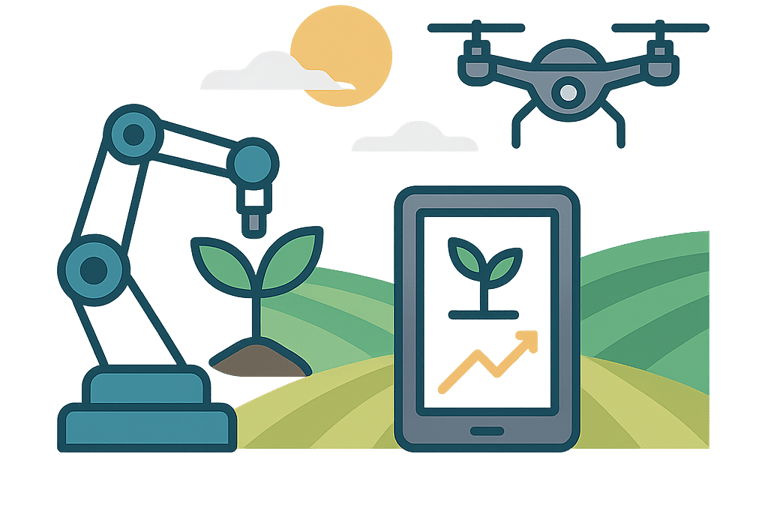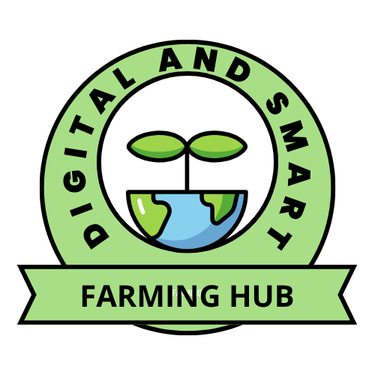

Cutting-edge Solutions
The agri-food sector faces major challenges and, at the same time, unique opportunities for digital transformation. With a wide diversity of crops and high-quality production, the sector plays a critical economic role. However, the adoption of digital technologies on farms and throughout the value chain still falls short of its full potential. Climate stress, growing water scarcity, rural depopulation, and constant pressure on farmers’ margins make a profound transformation essential—one based on innovation and the intelligent use of technology. In response, a Digital Agriculture Hub emerges as a strategic solution, catalyzing the sector’s modernization by uniting companies, startups, cooperatives, and research centers to accelerate the adoption of advanced technologies, promote sustainable practices, and generate both economic and social value.
This hub positions itself as a center for technological innovation focused on boosting efficiency, sustainability, and competitiveness in the agricultural industry through a comprehensive portfolio of technological, training, and collaboration services. Its fundamental purpose is to serve as a meeting point and generator of synergies for all stakeholders in the digital transformation of agriculture, enabling the adoption of tools such as IoT sensors, drones, AI-driven farm management, big data, traceability platforms, and automation. The vision is to become a key driver of the transition to smarter, more resilient, and more sustainable agriculture, harnessing technological innovation to address today’s challenges while preparing the sector for the future.
The market opportunity is clear, built on several key factors. Globally, the economic weight of international trade in the agri-food industry is reflected in key exports such as fruit, vegetables, olive oil, cereals, and meat products. Yet, digitalization and precision agriculture remain limited, particularly among small and medium-sized farms. Environmental and social pressures demand innovative solutions that improve resource management, optimize yields, and ensure farms’ economic sustainability—enabling a fairer distribution of wealth across the agricultural system. Worldwide, trends such as regenerative agriculture, smart sensors, data-driven predictive analytics, and digital traceability are gaining traction, and countries cannot afford to fall behind if they want to remain competitive.
The hub is designed as an effective response to these needs, providing an ecosystem that facilitates the adoption of cutting-edge technologies, promotes specialized training, encourages collaboration across stakeholders, and drives applied research projects that contribute to the sector’s continuous improvement. It will deliver services for technology development and validation, functioning as a testing laboratory for sensors, drones, agronomic management platforms, and autonomous machinery. Through pilot projects on real farms, the hub will measure the impact of these technologies on critical factors such as water consumption, crop health, and production input efficiency, thereby enabling adaptation and scalability of solutions.
Additionally, the hub will provide digitalization and precision agriculture services, including the deployment of IoT sensors for soil, climate, and crop monitoring, the creation of yield and crop health maps, and the development of AI-based predictive models to anticipate crop productivity, irrigation needs, pest or disease risks, and optimal harvest times. Training and talent development will be another fundamental pillar, with innovative programs that include specialized courses for farmers, technicians, and companies, as well as intensive bootcamps for AgTech startups and entrepreneurs—ensuring the creation and retention of skilled talent in agricultural technologies.
Connection and collaboration will also be a defining value of the hub. It will establish strategic partnerships with emerging AgTech startups, specialized investors, universities, research centers, and traditional agri-food companies. This network will foster open innovation, joint project development, and the creation of synergies that amplify the impact of implemented technologies. The hub will also promote sustainability-oriented projects such as reducing water and carbon footprints and adopting regenerative agricultural practices supported by digital tools.
B2B services will be offered to agricultural and agri-food companies, providing access to tailored digitalization, training, and consulting solutions. The hub will also participate in research and development projects funded by European and national programs, leveraging co-financing opportunities. Specialized training and consulting will be recurring services, while public–private partnerships and potential technology commercialization will open additional avenues of monetization. Spin-off creation and intellectual property licensing will further drive growth and value creation.
The expected impact of the hub is both significant and multidimensional. Anticipated outcomes include reduced water consumption, improved water-use efficiency, and the adoption of cultural practices that enhance agronomic crop management, ultimately improving the efficiency of production inputs. The hub will also contribute to rural development by creating specialized jobs and retaining young talent—vital for the sector’s renewal.
In short, this Digital Agriculture Hub aspires to become the catalyst for the sector’s technological transformation, uniting knowledge, technology, and markets to address today’s challenges and unlock new economic and social opportunities. Through a comprehensive portfolio of technological services, training, and collaboration, it will accelerate the large-scale adoption of digital solutions, making agriculture more efficient, sustainable, and competitive. Investment in this project is therefore a commitment to the future of a key sector, with significant and lasting economic, social, and environmental returns.


